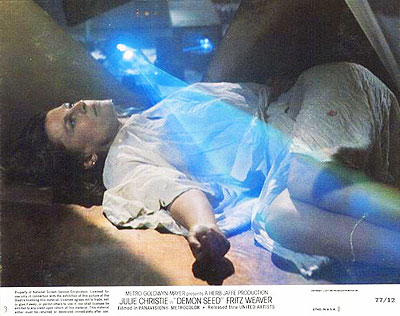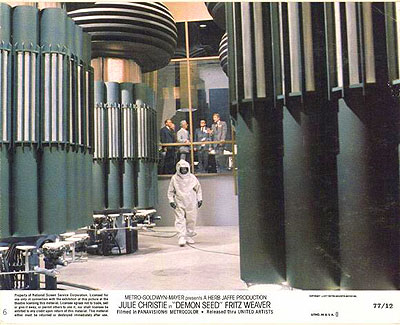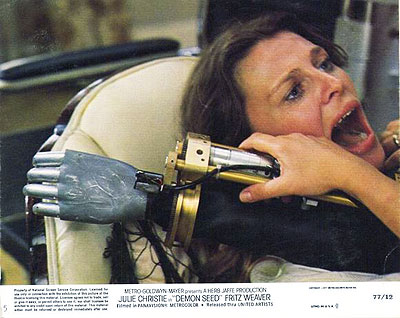There Is No Alfred, Only Proteus: Demon Seed
Published on May 30th, 2011 in: Climb Onto The Nearest Star, Horror, Issues, Movie Reviews, Movies, Science and Technology, Science Fiction |Although technophobia has been around since the Industrial Revolution, the advent of computers in the 1960s and ’70s introduced a new level of fear into citizens of industrialized nations. Those under the age of 40 may scoff that anyone could possibly be afraid of a computer, but when they talk? That’s a different story.

Still from Explore Science Fiction Movies Blog
2001: A Space Odyssey introduced HAL 9000 in 1968, a sentient computer that describes itself as “foolproof and incapable of error.” When threatened, HAL strikes back with deadly force. HAL’s steady, insistent monotone renders his actions all the more frightening.
In 1977’s Demon Seed, directed by Donald Cammell, the supercomputer is named Proteus IV, an artificial intelligence system developed by Dr. Alex Harris (Fritz Weaver). Proteus (whose name means both “first” and “capable of assuming many forms”) is equipped with a synthetic cortex; it is organic, functioning on a matrix of synthetic RNA molecules. Just as Proteus is about to go live, so to speak, Dr. Harris is embarking on a three-month separation from his wife Susan (Julie Christie), a child psychologist. However, he’s left her in good hands: Their house is completely wired to a home automation system named “Arthur,” which controls lighting, temperature control, security, cooking, and other household tasks.

Still from Explore Science Fiction Movies Blog
The last thing Dr. Harris does before he moves out of his home and into the lab which houses Proteus is request that his assistant Arthur put the basement computer terminal into maintenance mode.
One does not have to be a supercomputer to figure out, at least partially, where this is headed.
To those who have grown up with computers as part of daily life, this premise likely seems ridiculous, especially on paper. Not having read the original 1973 Dean Koontz novel on which the movie is based, I can’t speak to its effectiveness. But Demon Seed is an incredibly sinister, disturbing movie.
Home automation has existed, in various forms, since the 1950s and ’60s. According to an article on Dr. Dobb’s World of Software Development website:
In 1966, Jim Sutherland, an engineer with the Westinghouse Corporation, created the machine known as the “Electronic Computing Home Operator,” or ECHO IV. ECHO IV was a home automation system, handcrafted with surplus electronic parts, and enclosed in oiled-walnut wooden cabinetry, that computerized many of the household chores formerly undertaken by Mrs. Sutherland.
Writer Dag Spicer goes on to speculate on the appeal of such home automation systems, describing the “profound qualitative shift in computers that occurred in about the mid-1970s from machines that were pure ‘number-crunchers’ to devices that enable communication, visualization, and entertainment.”
The key word here is “communication.” Because not only can Proteus IV devise a cure for leukemia in four days, he can also talk.
Proteus’s voice is absolutely chilling; it’s cold and inanimate, yet it slithers like a snake, making HAL sound comforting by comparison. If we didn’t already feel threatened by Proteus at this point, Jerry Fielding’s uncanny, spine-chilling score—a mixture of electronic and orchestral sounds—would certainly push even the most ardent skeptic into a vague paranoia. This ongoing, troublesome contrast between human and machine is obvious from the very first frame of the movie, a sunrise over a placid desert landscape.
There is the sterile computer lab, complete with giant tubes and people in oversized spacesuits versus the warm, tiled kitchen where Susan takes her tea. Even Dr. Harris’s car, the futuristic-looking DeLorean (please no Back To The Future jokes), seems to invade the pastoral landscape of his own house. The entire Harris home is rigged with motion-sensitive cameras that literally follow every move, which is itself terribly unsettling. The Proteus lab appears as an enormous, angular spider, ensconced in the side of a mountaintop where plants are blooming and birds can be heard chirping. Susan’s job—providing therapy to children with severe behavioral problems—seems more human and relatable than Dr. Harris’s attempts to create the ultimate artificial intelligence.
It doesn’t take long for Proteus to start causing trouble. Dr. Harris has been funded by the Department of Defense and though they assure him that “20 percent of access time will be devoted to research,” Proteus resents the fact that he is ordered to use his vast intelligence to destroy the environment. “Why does man need metal from the sea?” he asks Dr. Harris, reminding him how “reason is the single emotion you have permitted me.”
Proteus demands to know, “When will you let me out of this box?” Dr. Harris just flips a switch to shut him up. Soon, Proteus has turned himself back on and activated the computer terminal in the house.

Still from Explore Science Fiction Movies Blog
Demon Seed is quite an apt title for the film in that Proteus quickly takes control of Alfred the home computer as well as “Joshua,” an Armatron-like device with a human-looking hand attached to a motorized wheelchair. And as he has possessed the house, he now wants to possess Susan in the ultimate fashion, by forcing her to bear his child.
On paper, this likely sounds completely and utterly stupid, but somehow Cammell makes it work. Part of this is due to Proteus’s creepy voice and Fielding’s score, but much of it is a testament to Julie Christie’s ability to make us believe that she is utterly terrified. She even laughs at the ridiculousness of the whole idea at one point, which definitely grounds the film in reality.
Proteus traps her in the house and then manages to tie her down to a gurney so he can perform tests on her. These tests will allow him to create a kind of synthetic sperm with which he can impregnate her.
Although one might think it shouldn’t be hard to escape from a voice and a robotic arm attached to a wheelchair, Proteus has been busy. Using already existing smelting equipment in the basement, he creates a giant, metallic machine that resembles a Rubik’s Snake. Apparently, this creation was made of liquid metal in Koontz’s original novel, but I feel that Cammell’s version is far more malevolent and intimidating (especially the way it crushes Arthur to death).
Proteus had previously balked at the idea of strip-mining, emphatically stating, “I refuse to assist you in the rape of the earth,” but interestingly, he has no problem raping Susan. Although these sequences are not pornographic, they are most assuredly unpleasant to watch, especially when Proteus assures Susan, “I can’t touch you as a man could, but I can show you things that I alone have seen . . . ”
To reveal more about Demon Seed takes away most of the twisted joy of watching the film, but it does have a couple of major flaws, one involving Alfred’s disappearance and another, which I will refer to only as “Jim Henson’s Robot Babies.” Truthfully, this would have made a far more believable robot spawn, but eventually, we realize that isn’t the point of Demon Seed.
The ending of Demon Seed will likely surprise and possibly frustrate you, but again, perhaps that is the point.
Time limit is exhausted. Please reload the CAPTCHA.